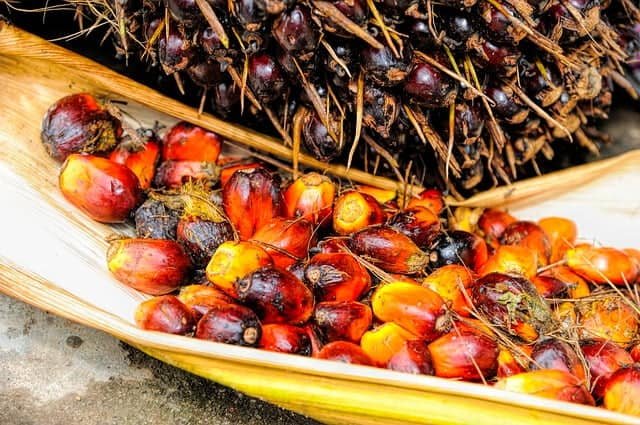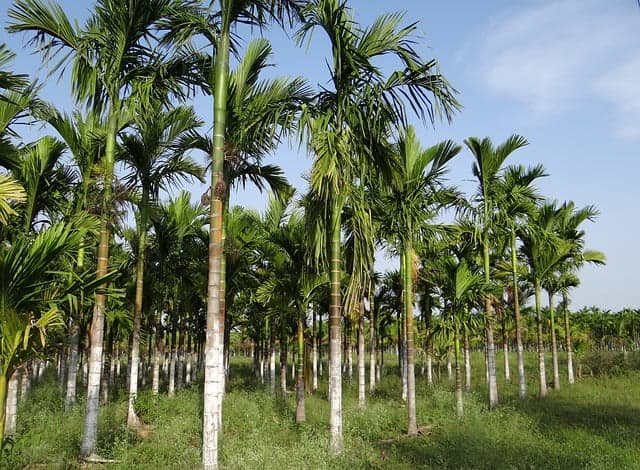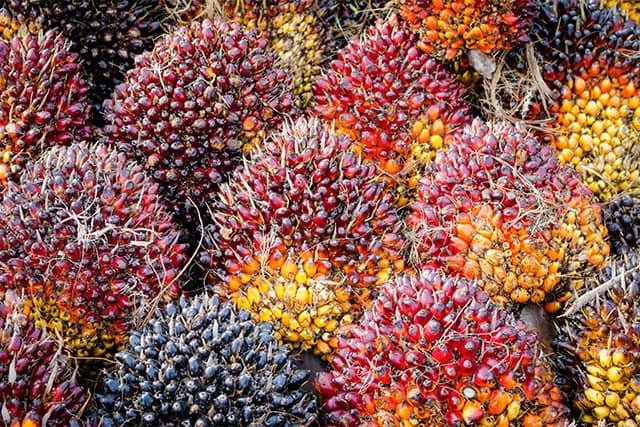At PA Food we’ve been sharing the taste of authentic Malaysian food since 1985. As a family-run business, our goal has always been to produce great products that reflect the unique smells, culture, vibrance, and of course tastes of Malaysia. Respecting the natural environment and land from which our food is made has always been a key principle which is why we’ve committed to using RSPO-approved sustainable palm oil. The benefits of using sustainable palm oil are far-reaching. Not only does it help protect our native forests and indigenous communities, but it also makes our products desired by global consumers for whom sustainability and ethical sourcing is now a key consideration.
What is palm oil and what is it used for?

Palm oil is a high-quality oil derived from the fruit of a palm tree. Malaysia and Indonesia make up about 85% of the world’s palm oil supply since the hot tropical climate offers the perfect conditions for palm tree growth. Palm oil is used as a key ingredient in food, detergent, cosmetics, and toiletries. In fact, WWF estimates that over 50% of products in the grocery store contain palm oil derivatives! Why such a high number? Palm oil is unique because it has a higher melting point, is spoil-resistant, freezable, and blends well with other compounds, making it useful in just about every consumer product imaginable.
Palm oil has fast become the food industry standard because unlike other vegetable oils, it has no trans fats, is less saturated (than products like butter) and contains antioxidants. In terms of food production, palm oil is used very regularly for producing things like noodles, cakes, bread, chocolate and pastry. PA Food parathas, sandwich buns and Upastry products can all credit their smooth consistent texture to the properties of palm oil!
How has palm oil impacted Malaysia’s environment?

Palm oil has revolutionized the global food industry within a very short space of time. The many applications of palm oil coupled with its low cost and high yield per square meter have resulted in huge demand.
We are now starting to understand the pressure this has put pressure Malaysia’s natural habitats which include:
Deforestation – To keep up with the high demand for palm oil here in Malaysia and abroad, more and more acres of forest land were being torn down to make space for palm tree plantations. Cutting down such large amounts of forest to accommodate plantations means that we have less plant life to absorb CO2 emissions which leads to global warming.
Displacement of wildlife – Losing too much natural forest land for palm estates gives our wonderful wildlife less living space and sources of food. This then creates competition between species for access to limited food sources. Displacing wildlife can also lead to animals coming into conflict with humans.
Displacement of indigenous people – Our indigenous communities such as the Orang Asli have been heavily affected by deforestation due to palm plantations. Groups like the Orang Asli use the forest to live and are often displaced as the demand for palm plantations increases.
What is sustainable palm oil?
Sustainable palm oil is produced using means that minimize the negative impacts associated with traditional palm oil production. For palm oil to be “sustainable”, it must be produced in accordance to guidelines set out by the RSPO (Roundtable on Sustainable Palm Oil). This organisation was set up in 2004 and is made up of representatives from the palm oil sector including producers, traders, NGOs, retailers and manufacturers from all around the world. The goal of the RSPO is to work together and set standards for sustainable palm oil production ensuring that it is used as widely as possible.
1. Fair working conditions for palm oil workers
2. Land rights of locals to be protected
3. Protected wildlife areas
4. Palm oil refining process is done with fewer emissions
How is sustainable palm oil helping Malaysia?
Sustainable palm oil is helping Malaysia in a number of ways from protecting natural habitats and communities to giving plantation workers more representation. An example of environmental victories is the reduction of peat fires which occur when landowners clear forest areas by burning the peat-based land. These fires unlocked huge amounts of carbon into the atmosphere, destroyed valuable wildlife, and often burned out of control causing further destruction. The gradual advancement of sustainable palm oil and guidelines from the RSPO has outlawed peat burning as a way to clear land.
Malayan palm oil workers are also benefiting from RSPO standards. Better working conditions, rights, a fair working wage, and protection from exploitation are just some of the things the RSPO fights for. It means that those that work in the farming and processing of palm oil have a better quality of life and are compensated for their work. This leads to a better standard of living for thousands of families across the country.
What does it mean for you as an importer?

Modern-day consumer trends are heavily weighted towards ethically sourced products. Now more than ever people are conscious of where their food has come from and how it has been processed. It’s not just individual consumers that are making more conscious choices with their food, restaurants, caterers, and vendors are all under pressure to source ingredients that are ethical down to every last ingredient!
PA Food became a member of the Roundtable on Sustainable Palm Oil (RSPO) on the 1st of July 2019. PA Food currently operates under a Mixed RSPO trademark and is part of a ‘mass balance’ supply chain. The Mass Balance (MB) supply chain model (in context to RSPO) is a system which monitors the trade of RSPO certified palm oil products throughout a supply chain that uses different palm oil sources. As society progresses toward full sustainability, mass balance allows for an effective transition towards that full sustainability. You can check our RSPO progress at www.rspo.org.
If you would like to work with PA Food and are interested in exporting our products, contact our friendly team today!
Share :








